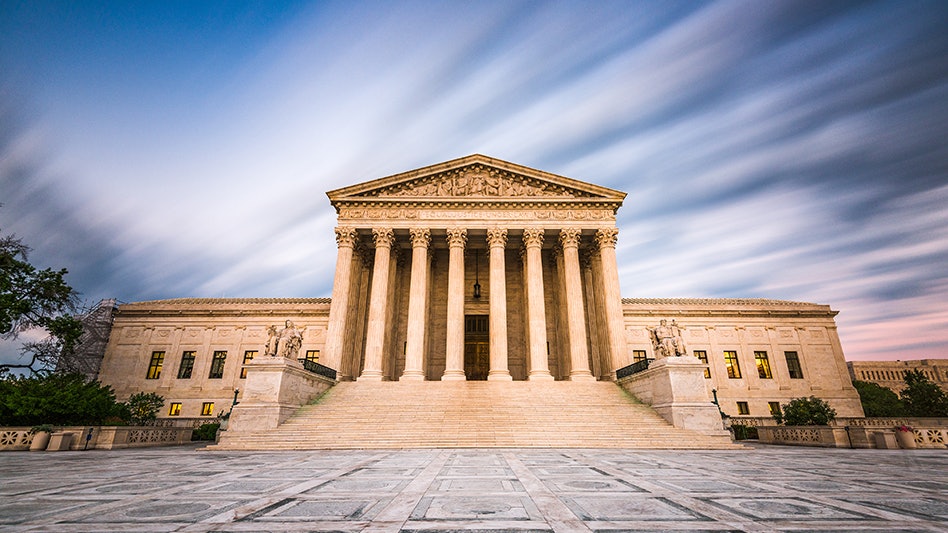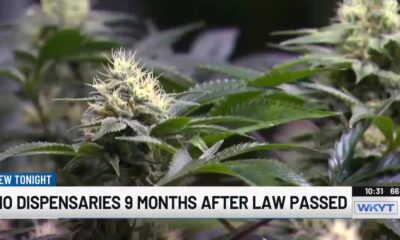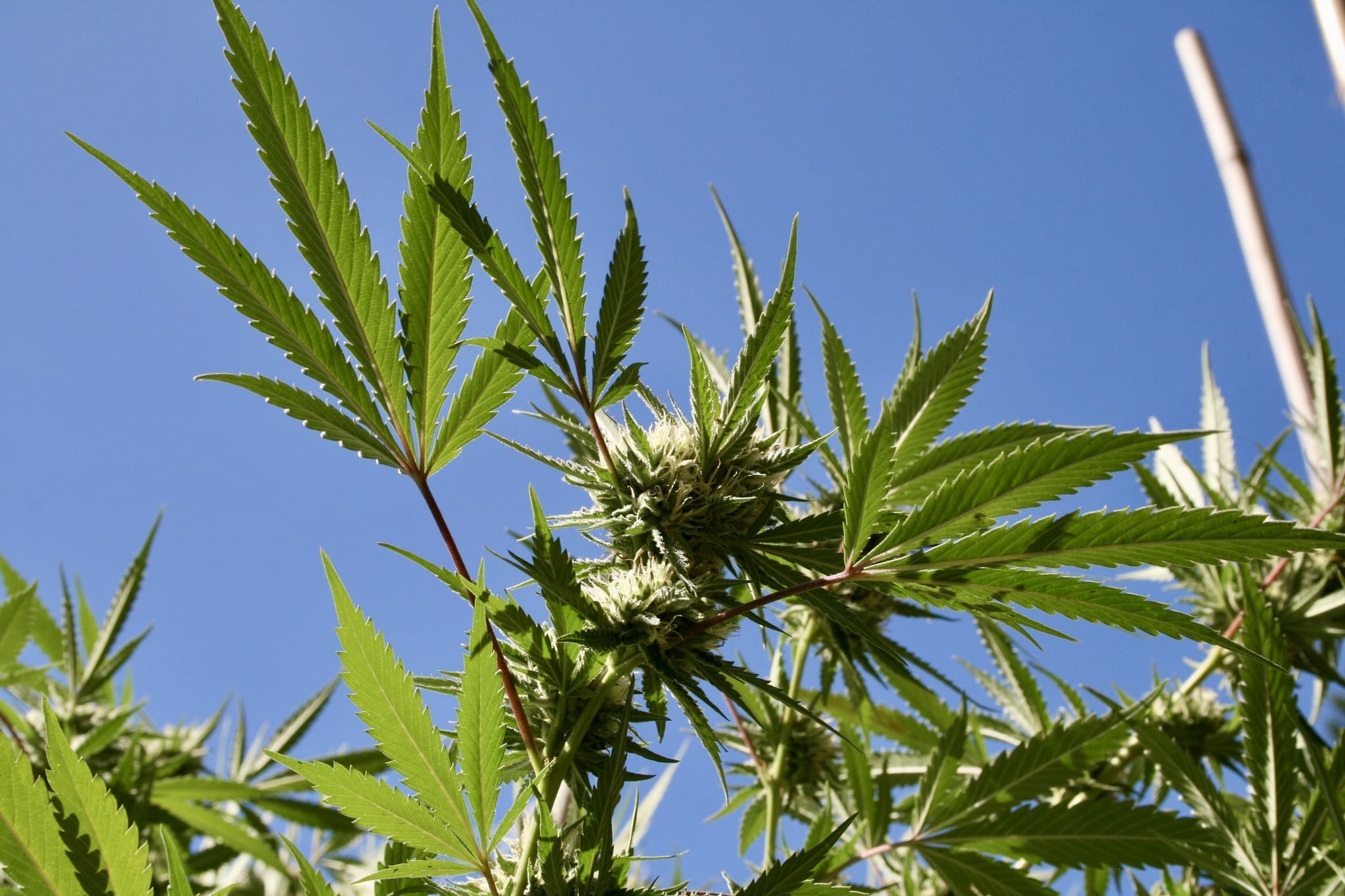featured
Supreme Court Allows Fired Truck Driver to Use Federal Racketeering Law to Sue Cannabis Company
Published
4 months agoon

The U.S. Supreme Court ruled on April 2 that civil racketeering law does not bar a truck driver from recovering harms to his business or property that derive from a personal injury related to cannabis consumption.
The case, Medical Marijuana Inc. v. Horn, stems from truck driver Joshua Horn and his wife filing a lawsuit against the California-based cannabis company in 2015 after he was fired following a failed drug test that turned up a positive result for THC. Horn claimed the CBD product that he consumed, Dixie X, manufactured by Medical Marijuana, was advertised as containing 0% THC.
A commercial truck driver for 14 years, Horn claimed that consuming the product caused him to lose his job, current and future wages, and insurance and pension benefits. He argued that the Racketeer Influenced and Corrupt Organizations (RICO) Act should allow him to recoup the damages related to the injury of his “business or property.”
Meanwhile, Medical Marijuana argued in defense that personal injuries are not included under RICO law.
The Supreme Court justices ruled in favor of Horn in a 5-4 opinion on Wednesday, affirming an appellate decision that the phrase “injured in his business or property” does not preclude recovery for all economic harms that result from personal injuries.
Conservative Associate Justice Amy Coney Barrett authored the opinion, while liberal-leaning associate justices Sonia Sotomayor, Elena Kagan and Ketanji Brown Jackson joined, as did conservative Associate Justice Neil M. Gorsuch.
“We must decide whether the statute, by implicitly denying a remedy for personal injuries, also denies a remedy for business and property loss that derives from a personal injury,” Barrett wrote. “It does not.”
RELATED: 6 Cannabis Industry Legal Cases, Policy Reforms and Trends to Watch in 2025
According to Horn, he specifically sought a natural wellness medication as an alternative to prescription drugs to relieve his pain following hip and shoulder injuries he sustained in a February 2012 motor accident. Through a magazine advertisement later that year, Horn discovered a Dixie X CBD tincture that was advertised as THC-free, according to the lawsuit.
While CBD is the main nonintoxicating compound found in cannabis, THC is the main intoxicating compound. As a commercial truck driver, it was important to Horn to remain THC-free since heavy equipment operators are subject to random drug tests required by the U.S. Department of Transportation.
“Because a positive drug test could cost him his job, Horn was wary of any product that might contain THC,” Barrett wrote. “But Dixie X seemed safe. It was described as a ‘CBD-rich,’ nonpsychoactive medicine that is ‘0% THC.’ Medical Marijuana’s online FAQ page promised that Dixie X was ‘legal to consume both here in the U.S. and in many countries abroad.’ Additional research, including a call to a customer service representative, reinforced those representations. Satisfied that Dixie X was THC-free, Horn bought a bottle and gave it a try.”
After he subsequently failed a drug test, Horn refused to complete a substance-abuse program because, in his view, doing so would constitute “an admission to doing drugs,” according to the lawsuit.
His employer then fired him, and Horn sued Medical Marijuana in the U.S. District Court of the Western District of New York, which sided with the defense—that Horn’s injury was personal and did not apply to RICO law—and dismissed the lawsuit.
In 2023, the U.S. Court of Appeals for the Second Circuit reversed that decision, concluding that Horn had been “injured in his business” when he lost his job, an injury applicable to the federal racketeering law.
Under RICO claims, any person injured in his or her business or property “shall recover threefold the damages” he or she sustains, according to federal law. Horn could also recoup his attorney fees from Medical Marijuana if he can prove the cannabis company caused injury to his business or property.
While the majority of Supreme Court justices opined this week that Medical Marijuana cannot fend off Horn’s RICO claim through the personal injury defense, the dissenting opinion offered concern over setting a new precedent that potentially opens the scope of applying RICO claims for every economic loss—including an everyday slip or fall.
Associate Justice Brett M. Kavanaugh wrote the dissenting opinion in which Chief Justice John G. Roberts Jr. and Associate Justice Samuel A. Alito joined. Associate Justice Clarence Thomas wrote his own dissenting opinion.
Kavanaugh wrote that the term “injured” is a tort-law term of art and, therefore, “should be given its established common-law meaning,” writing that Congress did not pluck the word “injured” out of thin air when the RICO Act was enacted in 1970.
“The fundamental question here is whether business or property losses from a personal injury transform a traditional personal-injury suit into a business-injury or property-injury suit that can be brought in federal court for treble damages under RICO,” Kavanaugh wrote.
In opining that the answer to that question is no—RICO does not authorize claims for personal injuries, regardless of what losses or damages a plaintiff sustains from a personal injury—Kavanaugh sided with Medical Marijuana and stated that the Sixth, Seventh and Eleventh circuits back his dissenting viewpoint.
At the same time, the majority opinion granted certiorari on April 2 to resolve the appellate split, siding with the Second and Ninth circuits, which hold that business and property “are no less injured” simply because the plaintiff also suffered “an antecedent” personal injury.
However, the Supreme Court justices did not “express” a view on whether Horn suffered an antecedent personal injury when he consumed THC.
“In the courts below, Horn characterized his injury as exclusively to his business and property because the defendants hurt his livelihood, not his body,” Barrett wrote. “Whatever the merits of this theory, the Second Circuit did not address it, and neither party asks us to revisit the District Court’s conclusion that Horn suffered a personal injury. So, like the Second Circuit, we proceed on the understanding that he did.”
According to Kavanaugh, had Congress intended for personal injuries to apply to RICO, then it wouldn’t have excluded those suits when the federal law was enacted in 1970.
Initially, the RICO Act was intended to combat organized crime and racketeering by providing a tool to prosecute those who infiltrate legitimate organizations that operate in interstate commerce. However, the Supreme Court determined in 1981 that the term “enterprise,” as used in RICO, included both legitimate and illegitimate enterprises, resulting in RICO claims flooding the federal court system since.
Now, by opening RICO law as a remedy for business and property losses relating to personal injuries, Kavanaugh wrote that the majority opinion opened the doors further.
“The aftermath of the Court’s opinion could be quite a mess, as courts grapple with RICO personal-injury cases where the question is what losses qualify as business or property losses,” he wrote.
In October 2024, when the case was argued before the Supreme Court, Horn’s attorney, Easha Anand, argued that there are specific guardrails under RICO that prevent a lion’s share of recoveries in most tort cases from making claims under the federal racketeering law.
“In your average slip-and-fall case, you’re not going to be able to prove a predicate act, let alone a pattern of predicate acts, let alone a pattern carried on through a racketeering enterprise,” Anand said.
While the Supreme Court justices in the majority opinion acknowledged the concerns of the dissenting justices, they also pointed to RICO’s guardrails fencing out certain claims.
“Medical Marijuana, together with the principal dissent, warn that the Second Circuit’s rule will eviscerate RICO’s ‘business or property’ limitation,” Barrett wrote. “In their view, a plaintiff can characterize any economic harm flowing from a personal injury as a harm to his business or property. Hence, they say, plaintiffs can easily transform garden-variety personal-injury claims into RICO suits for treble damages. While we understand the concern, Medical Marijuana and the dissent understate other constraints on civil RICO claims.”
The majority pointed to:
- RICO’s direct-relationship requirement demands a “direct” link between the injury asserted and the injurious conduct alleged;
- Pleading a RICO claim is not as simple as pointing to a business or property harm. A plaintiff must first establish a pattern of racketeering activity; and
- The reach of federal civil remedies turns on more than the meaning of “injured.” “Business” may not encompass every aspect of employment, and “property” may not include every penny in the plaintiff’s pocketbook.
“All of this said, civil RICO has undeniably evolved ‘into something quite different from the original conception of its enactors,’” Barrett wrote. “More suits are brought against ordinary businesses than against ‘archetypal, intimidating mobster[s],’ and given this development, Medical Marijuana is not the first litigant to express concern about the ‘over-federalization’ of ‘traditional state-law claims.’ But we respond today as we have before: If the breadth of the statute ‘leads to the undue proliferation of RICO suits, the correction must lie with Congress.’”

Author: mscannabiz.com
MScannaBIZ for all you Mississippi Cannabis News and Information.
You may like
-


Laws, public perception lagging risk, expert says
-


Federal Marijuana Legalization Bill Deserves Lawmakers’ Support, Letter From ACLU And Other Groups Says
-


Watertown could create new rules for cannabis shops
-


Rhode Island Opens Applications for 24 Adult-Use Dispensary Licenses
-


Kentucky still waiting on medical marijuana dispensaries 9 months after law passed
-


Can LSD Battle Anxiety? The Answer Is Yes, According to Science
featured
Federal Marijuana Legalization Bill Deserves Lawmakers’ Support, Letter From ACLU And Other Groups Says
Published
2 hours agoon
September 15, 2025
A coalition of drug policy reform and civil rights organizations sent letter urging members of the U.S. House of Representatives to cosponsor a recently filed bill to federally legalize marijuana and promote equity.
The letter, led by the Drug Policy Alliance (DPA), expresses support for the Marijuana Opportunity, Reinvestment and Expungement (MORE) Act, which was reintroduced by Rep. Jerrold Nadler (D-NY) and about three dozen cosponsors late last month.
This marks the fourth session in a row that Nadler has put forward the proposal. It passed the House twice under Democratic control while the sponsor served as chairman of the Judiciary Committee, but it did not advance last session with Republicans in the majority.
“The MORE Act is the leading comprehensive marijuana reform bill in the House that ends federal prohibition, addresses the collateral consequences of federal marijuana criminalization, and takes steps to ensure the regulated marketplace is diverse and inclusive,” the letter—which was also signed by groups such as the ACLU, National Association of Criminal Defense Lawyers, National Association of Social Workers, Service Employees International Union and Southern Poverty Law Center—says.
“For generations, marijuana’s placement on the [Controlled Substances Act, or CSA] has disproportionately inflicted harm upon communities of color and poor people,” the groups wrote.
They noted that the Trump administration is actively considering a proposal to simply reschedule cannabis, which they described as “a policy that would continue federal cannabis criminalization and its harm.”
With that reform pending, it’s “more important than ever for Congress to advance comprehensive legislation to deschedule marijuana from the CSA,” the letter says. “To be clear, as long as marijuana remains anywhere in the CSA, it will still be criminalized at the federal level.”
“Recent news reports have suggested that President Trump may move marijuana to Schedule III of the CSA. While this move would eliminate an unfair tax penalty on the marijuana industry and would be of symbolic importance by recognizing that marijuana has accepted medical use, little else would change. In fact, rescheduling marijuana from Schedule I to Schedule III of CSA will maintain the criminal penalties and collateral consequences that are in effect today. To fully address the conflict between state and federal laws, marijuana must be descheduled from the CSA.”
Other signatories on the letter include Cannabis Regulators of Color Coalition (CRCC), Doctors for Drug Policy Reform, JustLeadershipUSA, Last Prisoner Project (LPP), Law Enforcement Action Partnership (LEAP), Lawyers’ Committee for Civil Rights Under Law, Minority Cannabis Business Association (MCBA), Mission Green, NORML, Students for Sensible Drug Policy (SSDP), Supernova Women and more.
Here are details about the key provisions of the MORE Act:
- The bill would deschedule marijuana by removing it from the list of federally banned drugs under the CSA. However, it would not require states to legalize cannabis and would maintain a level of regulatory discretion up to states.
- Marijuana products would be subject to a federal excise tax, starting at five percent for the first two years after enactment and rising to eight percent by the fifth year of implementation.
- Nobody could be denied federal public benefits based solely on the use or possession of marijuana or past juvenile conviction for a cannabis offense. Federal agencies couldn’t use “past or present cannabis or marijuana use as criteria for granting, denying, or rescinding a security clearance.”
- Noncitizens could not be penalized under federal immigration laws for certain cannabis activity after the enactment of the legislation.
- The bill creates a process for expungements of non-violent federal marijuana convictions.
- Tax revenue from cannabis sales would be placed in a new “Opportunity Trust Fund.” Half of those tax dollars would support a “Community Reinvestment Grant Program” under the Justice Department, 10 percent would support substance misuse treatment programs, 40 percent would go to the federal Small Business Administration (SBA) to support implementation and a newly created equitable licensing grant program.
- The Community Reinvestment Grant Program would “fund eligible non-profit community organizations to provide a variety of services for individuals adversely impacted by the War on Drugs…to include job training, reentry services, legal aid for civil and criminal cases (including for expungement of cannabis convictions), among others.”
- The program would further support funding for substance misuse treatment for people from communities disproportionately impacted by drug criminalization. Those funds would be available for programs offering services to people with substance misuse disorders for any drug, not just cannabis.
- While the bill wouldn’t force states to adopt legalization, it would create incentives to promote equity. For example, SBA would facilitate a program to providing licensing grants to states and localities that have moved to expunge records for people with prior marijuana convictions or “taken steps to eliminate violations or other penalties for persons still under State or local criminal supervision for a cannabis-related offense or violation for conduct now lawful under State or local law.”
- The bill’s proposed Cannabis Restorative Opportunity Program would provide funds “for loans to assist small business concerns that are owned and controlled by individuals adversely impacted by the War on Drugs in eligible States and localities.”
- The comptroller general, in consultation with the head of the U.S. Department of Health and Human Services (HHS), would be required to carry out a study on the demographics of people who have faced federal marijuana convictions, “including information about the age, race, ethnicity, sex, and gender identity.”
- The departments of treasury, justice and the SBA would need to “issue or amend any rules, standard operating procedures, and other legal or policy guidance necessary to carry out implementation of the MORE Act” within one year of its enactment.
- Marijuana producers and importers would also need to obtain a federal permit. And they would be subject to a $1,000 per year federal tax as well for each premise they operate.
- The bill would impose certain packaging and labeling requirements.
- It also prescribes penalties for unlawful conduct such as illegal, unlicensed production or importation of cannabis products.
- The Treasury secretary would be required to carry out a study “on the characteristics of the cannabis industry, with recommendations to improve the regulation of the industry and related taxes.”
- The Bureau of Labor Statistics (BLS) would be required to “regularly compile, maintain, and make public data on the demographics” of marijuana business owners and workers.
- Workers in “safety sensitive” positions, such as those regulated by the Department of Transportation, could continue to be drug tested for THC and face penalties for unauthorized use. Federal workers would also continue to be subject to existing drug testing policies.
- References to “marijuana” or “marihuana” under federal statute would be changed to “cannabis.” It’s unclear if that would also apply to the title of the bill itself.
Getting a bill like the MORE Act through the GOP-controlled House and Senate is a tall task, however. And while Trump previously endorsed a Florida legalization ballot initiative, he’s given little indication he’d be willing to end prohibition altogether at the federal level.
A pending proposal to simply move cannabis from Schedule I to Schedule III under the CSA is still in flux—though the president did recently say a decision was imminent.
—
Marijuana Moment is tracking hundreds of cannabis, psychedelics and drug policy bills in state legislatures and Congress this year. Patreon supporters pledging at least $25/month get access to our interactive maps, charts and hearing calendar so they don’t miss any developments.![]()
Learn more about our marijuana bill tracker and become a supporter on Patreon to get access.
—
Numerous voices within Trump’s circles have expressed differing opinions on the reform.
Most recently, for example, Ben Carson, Trump’s former secretary of the Department of Housing and Urban Development (HUD), said a move to reschedule marijuana would play into plots to “destroy this country.”
Trump’s former press secretary Sean Spicer and his long-time advisor Roger Stone recently traded diverging takes on the prospect of the administration moving forward on marijuana rescheduling.
Stone separately made the case for reform in an op-ed for Marijuana Moment last month.
Retired boxer Mike Tyson, meanwhile, recently spoke about the need for federal marijuana rescheduling on a podcast hosted by the wife of White House Deputy Chief of Staff for Policy Stephen Miller—saying he’s expecting “good news” on the issue soon.
In June, the retired boxer also took to Fox News and delivered a message to the president, urging him to reschedule, and ultimately legalize, marijuana.
That interview came days after Tyson led a letter alongside other professional athletes and celebrities promoting cannabis reform that was sent to Trump, calling for rescheduling marijuana, expanding clemency and allowing licensed cannabis businesses to access the banking system.
Meanwhile, Trump’s former senior advisor Kellyanne Conway has been the “biggest champion” of marijuana rescheduling within the president’s “inner circle,” a GOP congressman recently told Marijuana Moment.
Photo courtesy of Brian Shamblen.

Author: mscannabiz.com
MScannaBIZ for all you Mississippi Cannabis News and Information.
featured
Rhode Island Opens Applications for 24 Adult-Use Dispensary Licenses
Published
3 hours agoon
September 15, 2025
[PRESS RELEASE] – WARWICK, R.I., Sept. 12, 2025 – The Cannabis Control Commission (CCC) opened the application period for adult-use cannabis retail licenses, marking the beginning of the largest expansion to Rhode Island’s cannabis industry. The commission is authorized under the Rhode Island Cannabis Act to license up to 24 retail establishments statewide, divided equally across six geographic zones, making this announcement a defining moment in shaping the state’s cannabis marketplace.
“Today’s announcement represents years of work, collaboration and preparation to ensure Rhode Island has a cannabis marketplace that is safe, transparent, and equitable,” CCC Chairperson Kim Ahern said. “The release of this application and launch of our submission portal is not only about opening doors for businesses but about creating meaningful opportunities for Rhode Islanders while keeping public health and public safety at the center of everything we do.”
With only 24 retail licenses available statewide, the launch of the application process is expected to draw significant interest from prospective applicants. Together with the Social Equity Applicant Status Certification Portal, which opened in August, the application process reflects the CCC’s deliberate steps toward building a cannabis industry that prioritizes economic opportunity, equity and fairness in Rhode Island.
“Rhode Island’s cannabis market is poised for growth, and this application is helping us do exactly that,” Gov. Dan McKee said. “As we expand the cannabis industry here in the Ocean State, we’re opening the doors to new investment, new good-paying jobs, and new opportunities for our economy.”
Adult-use retail licenses will authorize sales of cannabis products to adults 21 and older. By releasing the application and opening the submission portal simultaneously, the commission is providing applicants with a transparent process while reinforcing its commitment to accountability and access.
“Today’s release of the adult-use retail license application reflects the commission’s commitment to equity and accountability,” Commissioner Layi Oduyingbo said. “This framework provides applicants with the information they need while reinforcing our responsibility to safeguard public health and consumer safety.”
Commissioner Robert Jacquard said, “The commission aims to make this application process as business-friendly as possible, while upholding standards that will protect public health.”
To ensure the process is fair and accessible, the commission and Cannabis Office will provide technical assistance resources and ongoing guidance for prospective applicants. Applications will be accepted until 4 p.m. on Dec. 29, 2025.
“This is a milestone that reflects the dedication and perseverance of so many people,” Cannabis Office Administrator Michelle Reddish said. “From lawmakers and advocates to community members and our dedicated staff, countless individuals have helped build the foundation for this moment. By publishing the application today, we are taking a historic step toward building a cannabis marketplace that serves consumers, supports equity and advances public health in Rhode Island.”
The adult-use retail license application is available on the commission’s website at www.ccc.ri.gov/auapp.

Author: mscannabiz.com
MScannaBIZ for all you Mississippi Cannabis News and Information.
featured
Can LSD Battle Anxiety? The Answer Is Yes, According to Science
Published
4 hours agoon
September 15, 2025
Hands down, one of the drugs that has received the worst press in the decades marked by the War on Drugs has been LSD. All sorts of things have been said about this molecule: that it drives you crazy, or suicidal, that it remains stored in your body forever, that it irreparably damages the brain… Fortunately, we now have professionals investigating the matter, with a scientific perspective rather than a moralistic or prohibitionist one.
One of the latest findings on the subject seems to directly contradict one of the great myths about LSD: instead of leading to insanity, this compound could reduce anxiety. This is according to a study by Mind Medicine (MindMed) Inc., a biopharmaceutical company that has been researching psychedelic compounds for mental health for many years. While the preliminary results were released in 2022, they were officially published this month in the Journal of the American Medical Association.
This isn’t the first time MindMed has embarked on studying this topic: it had already achieved positive results with LSD for anxiety on another occasion. In fact, the FDA granted Breakthrough Therapy designation for generalized anxiety disorder (GAD) to the company’s proprietary drug candidate, MM120, a pharmacologically optimized formulation of LSD.
LSD and Anxiety: What the MindMed Study Says
The company conducted a multicenter, randomized, double-blind, placebo-controlled Phase 2b study at 22 outpatient psychiatric research centers in the US. The effects of a single dose of MM120 (lysergide D-tartrate, LSD) were analyzed in 198 adults with moderate to severe generalized anxiety disorder (GAD). Participants experienced sustained improvements in their condition over the 12-week observation period.
According to the company’s press release, this is the first randomized, placebo-controlled trial evaluating a single treatment at four dose levels (25, 50, 100, or 200 µg), without any psychotherapeutic intervention.
The optimal dose of MM120 was determined at 100 µg. This demonstrated a “clinically and statistically significant improvement vs. placebo, and a 65% clinical response rate and 48% clinical remission rate” at the end of the experiment.
Likewise, tolerance to the medication was positive, with the expected adverse effects of an LSD experience remaining mild to moderate and lasting only one day.
During the study, participants receiving medication for their condition had to discontinue such treatment under the supervision of the study professionals. Furthermore, on the day of dosing, they were offered “standardized music and eyeshades and could lie down, move freely around the room, read, write, or draw.” It should be noted that the study protocol explicitly prohibited participation in psychotherapy.
Dr. Maurizio Fava, one of the study’s authors, stated that “this study is a true turning point in the field of psychiatry… For the first time, LSD has been studied with modern scientific rigor, and the results are both clinically meaningful and potentially paradigm-shifting for the treatment of GAD. GAD affects 26 million adults in the U.S., yet no new medications have been approved since 2007—and first-line treatments fail 50% of patients.”
Thus, scientific innovation continues to advance against the willful ignorance of prohibitionists, working tirelessly to ensure patients have access to the relief that traditional therapies fail to provide.
This article was first published on El Planteo.

Author: mscannabiz.com
MScannaBIZ for all you Mississippi Cannabis News and Information.

Laws, public perception lagging risk, expert says

Federal Marijuana Legalization Bill Deserves Lawmakers’ Support, Letter From ACLU And Other Groups Says

Watertown could create new rules for cannabis shops

Rhode Island Opens Applications for 24 Adult-Use Dispensary Licenses

Kentucky still waiting on medical marijuana dispensaries 9 months after law passed

Can LSD Battle Anxiety? The Answer Is Yes, According to Science

Six hurt in shooting at marijuana event in SF's Bayview

Kentucky Medical Marijuana Dispensaries Should Be Stocked With Products Ready For Sale By Next Month, Top State Official Says

Deputies: 3,500 child sex abuse images, marijuana grow operation found in NC home raid

Regulators Ready to Enforce Cannabis Laws on Hemp THC Retailers in Maryland

California reaps over $250 million from 2nd Quarter cannabis sales

Meet the World’s First Cannabis Rugby Team: Crewmen 7’s Tackle Stigma Head-On

Texas Supreme Court Refuses To Take Up Marijuana Case Challenging State’s Rejection Of Local Decriminalization Law

California Passes Bill to Ban Intoxicating Hemp Products Outside Cannabis Market

Pending Federal Hemp Legislation Could Reshape The Legal Industry By Banning Some Products (Op-Ed)

Verano Proposes to Redomicile Parent Company From British Columbia to Nevada

8,000 cannabis plants seized from illegal Bradford grow-op

New York Lawmakers Schedule Psychedelics-Focused Hearing To Discuss ‘Medicinal Value And Risks’ Of Psilocybin

Curaleaf Opens Cannabis Dispensaries in Florida, Ohio

How to Protect Your Outdoor Cannabis Crops From Pests

Feds provide anti-cannabis group a platform to bash legalization (Newsletter: September 15, 2025)

Dozen arrested after south Mississippi bust for illegal sales to underage customers

The Toking Traveler: Why Amsterdam Weed Is Mostly Boof

Arkansas Medical Marijuana Sales Are On Track To Set A New Annual Record

Alert: Department of Cannabis Control updates data dashboards with full data for 2023

Connecticut Appoints The US’s First Cannabis Ombudsperson – Yes there is a pun in there and I’m Sure Erin Kirk Is Going To Hear It More Than Once!

5 best CBD creams of 2024 by Leafly

EU initiative begins bid to open access to psychedelic therapies
New Study Analyzes the Effects of THCV, CBD on Weight Loss

Free delta-9 gummies from Bay Smokes

Discover New York’s dankest cannabis brands [September 2024]

5 best autoflower seed banks of 2024 by Leafly

Press Release: CANNRA Calls for Farm Bill to Clarify Existing State Authority to Regulate Hemp Products

Curaleaf Start Process Of Getting Their Claws Into The UK’s National Health System – With Former MP (Resigned Today 30/5/24) As The Front Man

May 2024 Leafly HighLight: Pink Runtz strain

Local medical cannabis dispensary reacts to MSDH pulling Rapid Analytics License – WLBT

Recreational cannabis on ballot for third time in South Dakota

5 best THC drinks of 2024 by Leafly

Horn Lake denies cannabis dispensary request to allow sale of drug paraphernalia and Sunday sales | News

Mississippi city official pleads guilty to selling fake CBD products

6 best CBD gummies of 2024 by Leafly

Nevada CCB to Accept Applications for Cannabis Establishments in White Pine County – “Only one cultivation and one production license will be awarded in White Pine County”

The Daily Hit: October 2, 2024

5 best delta-9 THC gummies of 2024 by Leafly

Weekly Update: Monday, May 13, 2024 including, New Guide for Renewals & May Board meeting application deadline

PRESS RELEASE : Justice Department Submits Proposed Regulation to Reschedule Marijuana

5 best THCA flower of 2024 by Leafly

People In This State Googled ‘Medical Marijuana’ The Most, Study Shows
Trending
-

 California Cannabis Updates1 year ago
California Cannabis Updates1 year agoAlert: Department of Cannabis Control updates data dashboards with full data for 2023
-

 Breaking News1 year ago
Breaking News1 year agoConnecticut Appoints The US’s First Cannabis Ombudsperson – Yes there is a pun in there and I’m Sure Erin Kirk Is Going To Hear It More Than Once!
-

 best list1 year ago
best list1 year ago5 best CBD creams of 2024 by Leafly
-

 Business12 months ago
Business12 months agoEU initiative begins bid to open access to psychedelic therapies
-

 cbd1 year ago
cbd1 year agoNew Study Analyzes the Effects of THCV, CBD on Weight Loss
-

 Bay Smokes1 year ago
Bay Smokes1 year agoFree delta-9 gummies from Bay Smokes
-

 cannabis brands12 months ago
cannabis brands12 months agoDiscover New York’s dankest cannabis brands [September 2024]
-

 autoflower seeds12 months ago
autoflower seeds12 months ago5 best autoflower seed banks of 2024 by Leafly





